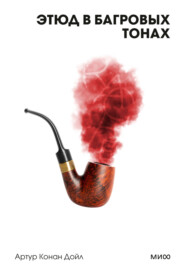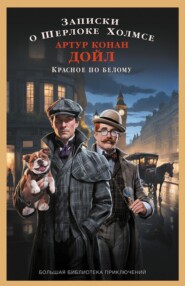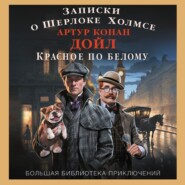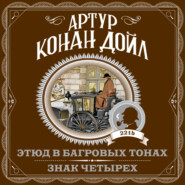По всем вопросам обращайтесь на: info@litportal.ru
(©) 2003-2025.
✖
The Firm of Girdlestone
Настройки чтения
Размер шрифта
Высота строк
Поля
"Impossible!" said the doctor, fumbling with nervous fingers at the envelope. "By Jove, though," he continued, as he glanced over the contents, "you're right. He has. Poor lad! he's more cut up about it than we can be, so we must not blame him."
The good physician read the letter over several times before he finally put it away in his note-book, and he did so with a thoughtful face which showed that it was of importance. As it has an influence upon the future course of our story we cannot end the chapter better than by exercising our literary privilege, and peeping over the doctor's shoulder before he has folded it up. This is the epistle in extenso: —
"My Dear Father,
"You will be sorry to hear that I have failed in my exam. I am very cut up about it, because I fear that it will cause you grief and disappointment, and you deserve neither the one nor the other at my hands."
"It is not an unmixed misfortune to me, because it helps me to make a request which I have long had in my mind. I wish you to allow me to give up the study of medicine and to go in for commerce. You have never made a secret of our money affairs to me, and I know that if I took my degree there would never be any necessity for me to practise. I should therefore have spent five years of my life in acquiring knowledge which would not be of any immediate use to me. I have no personal inclination towards medicine, while I have a very strong objection to simply living in the world upon money which other men have earned. I must therefore turn to some fresh pursuit for my future career, and surely it would be best that I should do so at once. What that fresh pursuit is to be I leave to your judgment. Personally, I think that if I embarked my capital in some commercial undertaking I might by sticking to my work do well. I feel too much cast down at my own failure to see you to-night, but to-morrow I hope to hear what you think from your own lips."
"TOM."
"Perhaps this failure will do no harm after all," the doctor muttered thoughtfully, as he folded up the letter and gazed out at the cold glare of the northern sunset.
CHAPTER X.
DWELLERS IN BOHEMIA
The residence of Major Tobias Clutterbuck, late of the 119th Light Infantry, was not known to any of his friends. It is true that at times he alluded in a modest way to his "little place," and even went to the length of remarking airily to new acquaintances that he hoped they would look him up any time they happened to be in his direction. As he carefully refrained, however, from ever giving the slightest indication of which direction that might be, his invitations never led to any practical results. Still they had the effect of filling the recipient with a vague sense of proffered hospitality, and occasionally led to more substantial kindness in return.
The gallant major's figure was a familiar one in the card-room of the Rag and Bobtail, at the bow-window of the Jeunesse Doree. Tall and pompous, with a portly frame and a puffy clean-shaven face which peered over an abnormally high collar and old-fashioned linen cravat, he stood as a very type and emblem of staid middle-aged respectability. The major's hat was always of the glossiest, the major's coat was without a wrinkle, and, in short, from the summit of the major's bald head to his bulbous finger-tips and his gouty toes, there was not a flaw which the most severe critic of deportment – even the illustrious Turveydrop himself – could have detected. Let us add that the conversation of the major was as irreproachable as his person – that he was a distinguished soldier and an accomplished traveller, with a retentive memory and a mind stuffed with the good things of a lifetime. Combine all these qualities, and one would naturally regard the major as a most desirable acquaintance.
It is painful to have to remark, however, that, self-evident as this proposition might appear, it was vehemently contradicted by some of the initiated. There were rumours concerning the major which seriously compromised his private character. Indeed, such a pitch had they reached that when that gallant officer put himself forward as a candidate for a certain select club, he had, although proposed by a lord and seconded by a baronet, been most ignominiously pilled. In public the major affected to laugh over this social failure, and to regard it as somewhat in the nature of a practical joke, but privately he was deeply incensed. One day he momentarily dropped his veil of unconcern while playing billiards with the Honourable Fungus Brown, who was generally credited with having had some hand in the major's exclusion. "Be Ged! sir," the veteran suddenly exclaimed, inflating his chest and turning his apoplectic face upon his companion, "in the old days I would have called the lot of you out, sir, every demned one, beginning with the committee and working down; I would, be George!" At which savage attack the Honourable Fungus's face grew as white as the major's was red, and he began to wish that he had been more reserved in his confidences to some of his acquaintances respecting the exclusiveness of the club in question, or at least refrained from holding up the major's pilling as a proof thereof.
The cause of this vague feeling of distrust which had gone abroad concerning the old soldier was no very easy matter to define. It is true that he was known to have a book on every race, and to have secret means of information from stud-grooms and jockeys which occasionally stood him in good stead; but this was no uncommon thing among the men with whom he consorted. Again, it is true that Major Clutterbuck was much addicted to whist, with guinea points, and to billiard matches for substantial sums, but these stimulating recreations are also habitual to many men who have led eventful lives and require a strong seasoning to make ordinary existence endurable. Perhaps one reason may have been that the major's billiard play in public varied to an extraordinary degree, so that on different occasions he had appeared to be aiming at the process termed by the initiated "getting on the money." The warm friendships, too, which the old soldier had contracted with sundry vacuous and sappy youths, who were kindly piloted by him into quasi-fashionable life and shown how and when to spend their money, had been most uncharitably commented upon. Perhaps the vagueness about the major's private residence and the mystery which hung over him outside his clubs may also have excited prejudice against him. Still, however his detractors might malign him, they could not attempt to deny the fact that Tobias Clutterbuck was the third son of the Honourable Charles Clutterbuck, who again was the second son of the Earl of Dunross, one of the most ancient of Hibernian families. This pedigree the old soldier took care to explain to every one about him, more particularly to the sappy youths aforementioned.
It chanced that on the afternoon of which we speak the major was engrossed by this very subject. Standing at the head of the broad stone steps which lead up to the palatial edifice which its occupiers irreverently term the Rag and Bobtail, he was explaining to a bull-necked, olive-complexioned young man the series of marriages and inter-marriages which had culminated in the production of his own portly, stiff-backed figure. His companion, who was none other than Ezra Girdlestone, of the great African firm of that name, leaned against one of the pillars of the portico and listened gloomily to the major's family reminiscences, giving an occasional yawn which he made no attempt to conceal.
"It's as plain as the fingers of me hand," the old soldier said in a wheezy muffled brogue, as if he were speaking from under a feather-bed. "See here now, Girdlestone – this is Miss Letitia Snackles of Snackleton, a cousin of old Sir Joseph." The major tapped his thumb with the silver head of his walking-stick to represent the maiden Snackles. "She marries Crawford, of the Blues – one o' the Warwickshire Crawfords; that's him" – here he elevated his stubby forefinger; "and here's their three children, Jemima, Harold, and John." Up went three other fingers. "Jemima Crawford grows up, and then Charley Clutterbuck runs away with her. This other thumb o' mine will stand for that young divil Charley, and then me fingers – "
"Oh, hang your fingers," Girdlestone exclaimed with emphasis. "It's very interesting, major, but it would be more intelligible if you wrote it out."
"And so I shall, me boy!" the major cried enthusiastically, by no means abashed at the sudden interruption. "I'll draw it up on a bit o' foolscap paper. Let's see; Fenchurch Street, eh? Address to the offices, of course. Though, for that matter, 'Girdlestone, London,' would foind you. I was spakin' of ye to Sir Musgrave Moore, of the Rifles, the other day, and he knew you at once. 'Girdlestone?' says he. 'The same,' says I. 'A merchant prince?' says he. 'The same,' says I. 'I'd be proud to meet him,' says he. 'And you shall,' says I. He's the best blood of county Waterford."
"More blood than money, I suppose," the young man said, smoothing out his crisp black moustache.
"Bedad, you've about hit it there. He went to California, and came back with five and twinty thousand pounds. I met him in Liverpool the day he arrived. 'This is no good to me, Toby,' says he. 'Why not?' I asks. 'Not enough,' says he; 'just enough to unsettle me.' 'What then?' says I. 'Put it on the favourite for the St. Leger,' says he. And he did too, every pinny of it, and the horse was beat on the post by a short head. He dropped the lot in one day. A fact, sir, 'pon me honour! Came to me next day. 'Nothing left!' says he. 'Nothing?' says I. 'Only one thing,' says he. 'Suicide?' says I. 'Marriage,' says he. Within a month he was married to the second Miss Shuttleworth, who had five thou. in her own right, and five more when Lord Dungeness turns up his toes."
"Indeed?" said his companion languidly.
"Fact, 'pon me honour! By the way – ah, here comes Lord Henry Richardson. How d'ye do, Richardson, how d'ye do? Ged, I remember Richardson when he was a tow-headed boy at Clongowes, and I used to lam him with a bootjack for his cheek. Ah, yes; I was going to say – it seems a demned awkward incident – ha! ha! – ridiculous, but annoying, you know. The fact is, me boy, coming away in a hurry from me little place, I left me purse on the drawers in the bedroom, and here's Jorrocks up in the billiard-room afther challenging me to play for a tenner – but I won't without having the money in me pocket. Tobias Clutterbuck may be poor, me dear friend, but" – and here he puffed out his chest and tapped on it with his round, sponge-like fist – "he's honest, and pays debts of honour on the nail. No, sir, there's no one can say a word against Tobias, except that he's a half-pay old fool with more heart than brains. However," he added, suddenly dropping the sentimental and coming back to the practical, "if you, me dear boy, can obloige me with the money until to-morrow morning, I'll play Jorrocks with pleasure. There's not many men that I'd ask such a favour of, and even from you I'd never accept anything more than a mere timporary convanience."
"You may stake your life on that," Ezra Girdlestone said with a sneer, looking sullenly down and tracing figures with the end of his stick on the stone steps. "You'll never get the chance. I make it a rule never to lend any one money, either for short or long periods."
"And you won't let me have this throifling accommodation?"
"No," the young man said decisively.
For a moment the major's brick-coloured, weather-beaten face assumed an even darker tint, and his small dark eyes looked out angrily from under his shaggy brows at his youthful companion. He managed to suppress the threatened explosion, however, and burst into a loud roar of laughter.
"'Pon me sowl!" he wheezed, poking the young man in the ribs with his stick, an implement which he had grasped a moment before as though he meditated putting it to a less pacific use, "you young divils of business-men are too much for poor old Tobias. Ged, sir, to think of being stuck in the mud for the want of a paltry tenner! Tommy Heathcote will laugh when he hears of it. You know Tommy of the 81st? He gave me good advice: 'Always sew a fifty-pound note into the lining of each waistcoat you've got. Then you can't go short.' Tried it once, and, be George! if me demned man-servant didn't stale that very waistcoat and sell it for six and sixpence. You're not going, are you?"
"Yes; I'm due in the City. The governor leaves at four. Good-bye.
Shall I see you to-night?"
"Card-room, as per usual," quoth the clean-shaven warrior. He looked after the retreating figure of his late companion with anything but a pleasant expression upon his face. The young man happened to glance round as he was half-way down the street, on which the major smiled after him paternally, and gave a merry flourish with his stick.
As the old soldier stood on the top of the club steps, pompous, pigeon-chested, and respectable, posing himself as though he had been placed there for the inspection of passers-by as a sample of the aristocracy within, he made several attempts to air his grievances to passing members touching the question of the expectant Jorrocks and the missing purse. Beyond, however, eliciting many sallies of wit from the younger spirits, for it was part of the major's policy to lay himself open to be a butt, his laudable perseverance was entirely thrown away. At last he gave it up in disgust, and raising his stick hailed a passing 'bus, into which he sprang, taking a searching glance round to see that no one was following him. After a drive which brought him to the other side of the City, he got out in a broad, busy thoroughfare, lined with large shops. A narrow turning from the main artery led into a long, dingy street, consisting of very high smoke-coloured houses, which ran parallel to the other, and presented as great a contrast to it as the back of a painting does to the front.
Down this sombre avenue the major strutted with all his wonted pomposity, until about half-way down he reached a tall, grim-looking house, with many notices of "apartments" glaring from the windows. The line of railings which separated this house from the street was rusty, and broken and the whole place had a flavour of mildew. The major walked briskly up the stone steps, hollowed out by the feet of generations of lodgers, and pushing open the great splotchy door, which bore upon it a brass plate indicating that the establishment was kept by a Mrs. Robins, he walked into the hall with the air of one who treads familiar ground. Up one flight of stairs, up two flights of stairs, and up three flights of stairs did he climb, until on the fourth landing he pushed open a door and found himself in a small room, which formed for the nonce the "little place" about which he was wont at the club to make depreciatory allusions, so skilfully introduced that the listener was left in doubt as to whether the major was the happy possessor of a country house and grounds, or whether he merely owned a large suburban villa. Even this modest sanctum was not entirely the major's own, as was shown by the presence of a ruddy-faced man with a long, tawny beard, who sat on one side of the empty fire-place, puffing at a great china-bowled pipe, and comporting himself with an ease which showed that he was no casual visitor.
As the other entered, the man in the chair gave vent to a guttural grunt without removing the mouthpiece of his pipe from between his lips; and Major Clutterbuck returned the greeting with an off-handed nod. His next proceeding was to take off his glossy hat and pack it away in a hat-box. He then removed his coat, his collar, his tie, and his gaiters, with equal solicitude, and put them in a place of safety. After which he donned a long purple dressing-gown and a smoking-cap, in which garb he performed the first steps of a mazurka as a sign of the additional ease which he experienced.
"Not much to dance about either, me boy," the old soldier said, seating himself in a camp-chair and putting his feet upon another one. "Bedad, we're all on the verge. Unless luck takes a turn there's no saying what may become of us."
"We have been badder than this before now many a time," said the yellow-bearded man, in an accent which proclaimed him to be a German. "My money vill come, or you vill vin, or something vill arrive to set all things right."
"Let's hope so," the major said fervently. "It's a mercy to get out of these stiff and starched clothes; but I have to be careful of them, for me tailor – bad cess to him! – will give no credit, and there's little of the riddy knocking about. Without good clothes on me back I'd be like a sweeper without a broom."
The German nodded his intense appreciation of the fact, and puffed a great blue cloud to the ceiling. Sigismond von Baumser was a political refugee from the fatherland, who had managed to become foreign clerk in a small London firm, an occupation which just enabled him to keep body and soul together. He and the major had lodged in different rooms in another establishment until some common leaven of Bohemianism had brought them together. When circumstances had driven them out of their former abode, it had occurred to the major that by sharing his rooms with Von Baumser he would diminish his own expenses, and at the same time secure an agreeable companion, for the veteran was a sociable soul in his unofficial hours and had all the Hibernian dislike to solitude. The arrangement commended itself to the German, for he had a profound admiration for the other's versatile talents and varied experiences; so he grunted an acquiescence and the thing was done. When the major's luck was good there were brave times in the little fourth floor back. On the other hand, if any slice of good fortune came in the German's way, the major had a fair share of the prosperity. During the hard times which intervened between these gleams of opulence, the pair roughed it uncomplainingly as best they might. The major would sometimes create a fictitious splendour by dilating upon the beauties of Castle Dunross, in county Mayo, which is the headquarters of all the Clutterbucks. "We'll go and live there some day, me boy," he would say, slapping his comrade on the back. "It will be mine from the dungeons forty foot below the ground, right up, bedad, to the flagstaff from which the imblem of loyalty flaunts the breeze." At these speeches the simple-minded German used to rub his great red hands together with satisfaction, and feel as pleased as though he had actually been presented with the fee simple of the castle in question.
"Have you had your letter?" the major asked with interest, rolling a cigarette between his fingers. The German was expecting his quarterly remittance from his friends at home, and they were both anxiously awaiting it.
Von Baumser shook his head.
"Bad luck to them! they should have sent a wake ago. You should do what Jimmy Towler did. You didn't know Towler, of the Sappers? When he and I were souldiering in Canada he was vexed at the allowance which he had from ould Sir Oliver, his uncle, not turning up at the right time. 'Ged, Toby,' he says to me, 'I'll warm the old rascal up.' So he sits down and writes a letter to his uncle, in which he told him his unbusiness-like ways would be the ruin of them, and more to the same effect. When Sir Oliver got the letter he was in such a divil's own rage, that while he was dictating a codicil to his will he tumbled off the chair in a fit, and Jimmy came in for a clean siven thousand a year."
"Dat was more dan he deserved," the German remarked. "But you – how do you stand for money?"
Major Clutterbuck took ten sovereigns out of his trouser pocket and placed them upon the table. "You know me law," he said; "I never, on any consideration, break into these. You can't sit down to play cards for high stakes with less in your purse, and if I was to change one, be George! they'd all go like a whiff o' smoke. The Lord knows when I'd get a start again then. Bar this money I've hardly a pinny."
"Nor me," said Von Baumser despondently, slapping his pockets.
"Niver mind, me boy! What's in the common purse, I wonder?"
He looked up at a little leather bag which hung from a brass nail on the wall. In flush times they were wont to deposit small sums in this, on which they might fall back in their hours of need.
"Not much, I fear," the other said, shaking his head.
"Well, now, we want something to pull us together on a dull day like this. Suppose we send out for a bottle of sparkling, eh?"
"Not enough money," the other objected.
"Well, well, let's have something cheaper. Beaune, now; Beaune's a good comforting sort of drink. What d'ye say to splitting a bottle of Beaune, and paying for it from the common purse?"
"Not enough money," the other persisted doggedly.
"Well, claret be it," sighed the major. "Maybe it's better in this sort of weather. Let us send Susan out for a bottle of claret?"

















